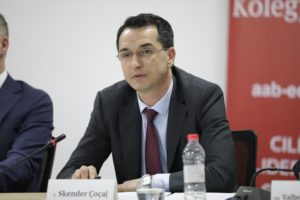

As part of the celebration of Human Rights Week organized by AAB College’s Faculty of Law, a discussion on the topic of Human Rights funded by the Norwegian Government and UNDP was held today, where the Human Rights Platform was presented.
At this roundtable, the People’s Advocate, Hilmi Jashari, first spoke to the students about the history of the institution he runs. He said the Ombudsman was established in Sweden about 200 years ago, and today there are 140 countries in the world that have this institution.
Jashari also spoke about the genesis of the establishment of this institution in Kosovo, saying that it all began with the documents of the Rambouillet Agreement.
Chairman of the Kosovo Judicial Council, Skender Çoçaj, said that the protection of human rights remains a challenge not only for our country but also for countries that are at the highest level of democracy.
Çoçaj reminded students that the protection of human rights in Kosovo is a constitutional right: “Article 22 of the Constitution of Kosovo guarantees direct applicability of international agreements and in the event of conflict guarantees its priority over laws and other acts of public institutions.” This is due to the fact that Kosovo is still unable to ratify international human rights conventions, as it is not a member of the UN and other international mechanisms.
Valbona Bogujevci from the UNDP said Kosovo’s legal framework broadly guarantees the protection of human rights, but more serious commitment is needed to implement the legislation.
Bahri Hyseni, President of the Kosovo Prosecutorial Council, said that the KPC is taking steps to advance human rights protection in order to provide citizens with timely investigations, efficient procedures in prosecuting perpetrators and bring them to justice as required by law.
“Our daily struggle is to enforce the legislation fairly and impartially so that citizens can be treated with respect and dignity, on the principles of European standards,” said Hyseni.
The Human Rights Platform was also presented at this roundtable, which will be a tool for all those who are professionally involved in law enforcement but will also assist scientific researchers in this field.
As part of the student debate, student Leandrit Llunji asked whether not allowing visa liberalization represents a human rights violation, in particular a restriction on freedom of movement, to which Norwegian Ambassador to Kosovo Jens Erik Grondahl responded, saying that that can be considered political discrimination.
“If it were up to me, I would have liberalize visas immediately. But once liberalization takes place, Kosovars will have the same approach as Norway. Is it a violation – legally no, but politically people can regard it as political discrimination. It may seem even more ridiculous to know that there are some countries like Georgia, Ukraine, Moldova enjoying visa liberalization, with little to no conditions set upon them”said Ambassador Grondahl.





